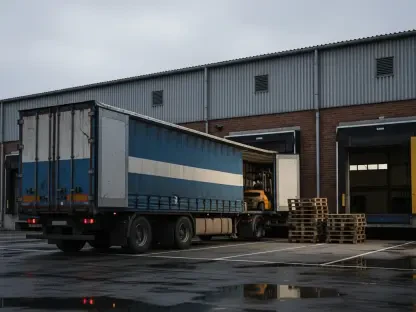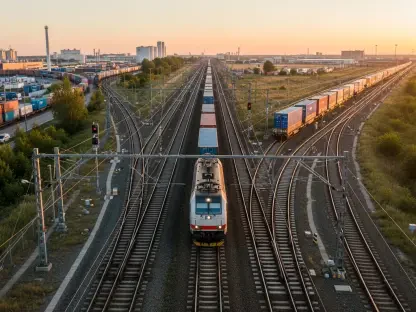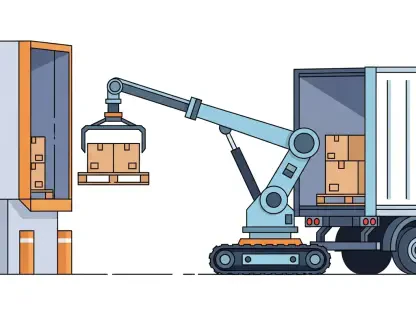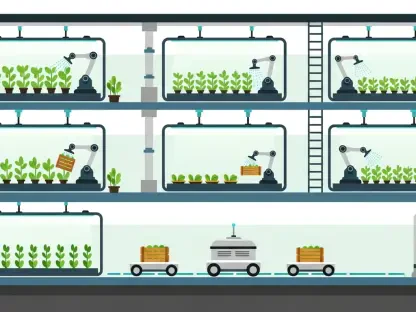Imagine a world where life-saving pharmaceuticals, fresh exotic flowers, and the latest fashion trends reach their destinations in mere hours, defying vast oceans and borders. This is the reality powered by air cargo, an industry moving goods worth over $8 trillion annually while accounting for just one percent of trade volume. At Air Cargo Week 2025, held in a bustling international hub, this critical sector took center stage, showcasing its indispensable role in driving global prosperity. The event brought together industry leaders, policymakers, and innovators to discuss how airfreight fuels economic growth, connects emerging markets, and adapts to modern challenges. With insights from experts like Glyn Hughes of TIACA, the gathering illuminated why air cargo remains a linchpin of today’s fast-paced economy.
Highlighting Air Cargo’s Economic Impact
Air Cargo Week 2025 kicked off with a powerful focus on how airfreight transforms global trade by slashing transit times for high-value and perishable goods. Presentations revealed that industries such as pharmaceuticals, fashion, and food rely heavily on this speed to maintain supply chains and meet consumer demands. The event emphasized that businesses, from small exporters to multinational corporations, reap immense benefits, with air cargo enabling market diversification and economic stability even amid geopolitical turbulence.
A striking case shared during the sessions involved a Canadian pork producer who, by leveraging airfreight to South Korea, saw a 50% revenue surge, elevating their business from $800 million to $1.2 billion. This example, highlighted by industry speakers, underscored the financial efficiency of air cargo and justified significant investments like chartering aircraft. Attendees noted how such stories reflect the sector’s capacity to turn logistical challenges into substantial economic gains.
Beyond individual success, the event explored air cargo’s broader role in fostering development across regions. Discussions pointed out that developing markets, particularly in Latin America and Africa, depend on airfreight to export fresh produce and flowers, directly impacting local livelihoods. Experts at the event stressed that this connectivity not only boosts economies but also improves access to education and infrastructure in these areas.
Tackling Trade Challenges with Resilience
One of the key panels at Air Cargo Week 2025 delved into the complexities of the current trade environment, addressing disruptions caused by political measures and tariffs. Speakers referenced historical executive actions impacting trade and how they continue to challenge decades-old manufacturing networks. The industry’s response, through strategies like “China Plus One” and “USA Plus One,” was a focal point, illustrating efforts to diversify production and mitigate risks.
Emerging economies also took the spotlight, with India’s ambitious plan to target 40 new export markets for garments serving as a prime example. Industry leaders at the event discussed how air cargo plays a pivotal role in swiftly establishing these new trade corridors. Glyn Hughes, a prominent voice during the sessions, emphasized that airfreight’s adaptability ensures supply chain resilience, even when faced with sudden policy shifts or global disruptions.
The dialogue extended to practical solutions, with attendees exploring how air cargo operators are innovating to maintain efficiency. Case studies presented showed companies rerouting shipments and optimizing logistics to bypass trade barriers. This adaptability, as highlighted during the event, positions air cargo as a critical tool for navigating an unpredictable global landscape.
E-Commerce and Consumer Trends Take Flight
A dynamic session at Air Cargo Week 2025 focused on the soaring demand for airfreight driven by e-commerce and shifting consumer behaviors. Industry representatives pointed to companies like Inditex, which rely on air cargo for ultra-fast fashion turnovers to meet rapid delivery expectations. This trend, fueled by a growing online shopping culture, has cemented airfreight as an essential link in modern retail networks.
New trade agreements also garnered attention, with the Regional Comprehensive Economic Partnership, spanning 15 nations, hailed as a game-changer for trade expansion. Speakers at the event noted that such pacts create opportunities for air cargo to facilitate larger volumes of goods across diverse markets. The synergy between these agreements and airfreight’s capabilities was presented as a catalyst for future growth.
Consumer demand for immediacy was another recurring theme, with discussions on how air cargo meets the need for next-day or even same-day deliveries. Panels showcased innovations in logistics technology that enhance tracking and efficiency, ensuring products reach buyers at unprecedented speeds. The event made it clear that air cargo is not just responding to trends but actively shaping the future of global commerce.
Bridging Emerging Markets to the World Stage
A dedicated segment of Air Cargo Week 2025 celebrated airfreight’s transformative impact on emerging markets. Presentations highlighted how regions in Latin America and Africa export perishable goods like fruits and flowers, directly benefiting from air cargo’s speed. This connectivity, as shared by regional representatives, has led to improved economic conditions and greater integration into global trade networks.
Expert insights during the event painted a vivid picture of social benefits, such as increased access to education and community development in these areas. Air cargo’s role in uplifting entire communities was a powerful narrative, with speakers illustrating how export revenues fund local initiatives. The discussions underscored that airfreight is more than logistics—it’s a driver of opportunity.
Challenges unique to these markets, including infrastructure limitations, were also addressed. Panels explored collaborative efforts between governments and private sectors to enhance airport facilities and streamline customs processes. The event showcased how such partnerships are vital for sustaining air cargo’s positive impact in less-developed regions.
Looking Ahead After Air Cargo Week 2025
Reflecting on Air Cargo Week 2025, the event proved to be a vital platform for understanding the immense value of air cargo, which moves over $8 trillion in goods each year. Industry leaders and stakeholders left with a renewed appreciation for how airfreight connects producers to consumers, supports economic recovery, and adapts to challenges like trade disputes. The gathering highlighted success stories, emerging market growth, and the sector’s pivotal role in e-commerce as enduring takeaways.
Moving forward, the discussions pointed to actionable steps such as investing in digital logistics tools to further enhance efficiency. Collaborations between nations to establish new trade zones and streamline regulations emerged as a priority to sustain growth. With an optimistic economic outlook for the coming years, as shared by international analysts during the event, the path ahead for air cargo appeared brighter than ever.
The event also sparked ideas for innovation, urging companies to explore sustainable practices to reduce environmental impact while meeting rising demand. As the industry builds on the momentum from Air Cargo Week 2025, strengthening partnerships and embracing technology will be key to ensuring air cargo continues to drive global prosperity.









